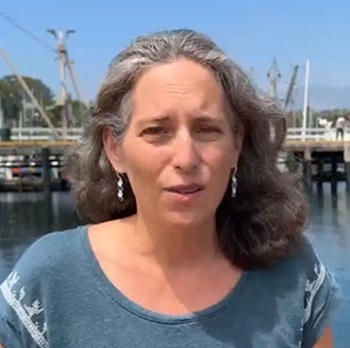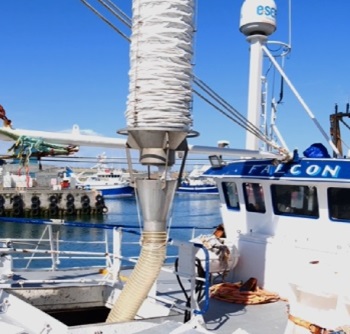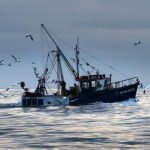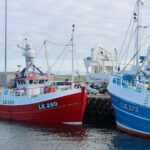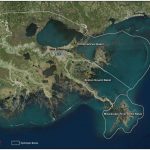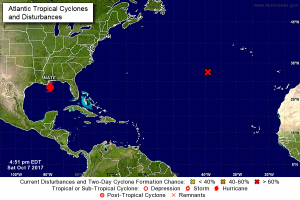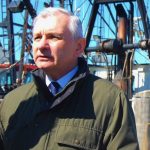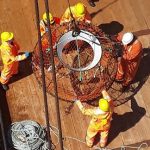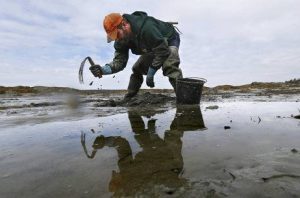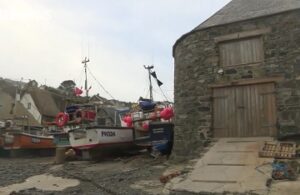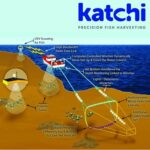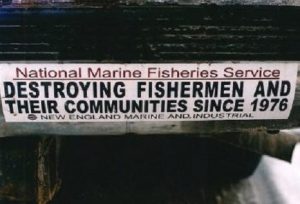Author Archives: borehead - Moderator
Commercial Fisherman Christopher E. Greco of Chatham, Ma. has passed away
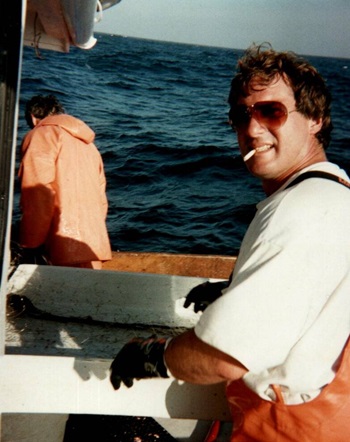 Christopher E. Greco 63, of Chatham, son of Fred Greco and Cora Stacy Greco, died suddenly and peacefully at his home on August 29. He suffered from COPD and heart problems for the last several years. He was born at Cape Cod Hospital and lived his entire life in Chatham working in the fishing industry after graduating from Chatham High School in 1979. He loved working on the water and crewed for Jack Our, John Tuttle, Stu Tolley and Mark Liska when fishing was much different than that it is today. He also went commercial shellfishing and scalloping when there were scallops to be had. more, >>CLICK TO READ<< 14:14
Christopher E. Greco 63, of Chatham, son of Fred Greco and Cora Stacy Greco, died suddenly and peacefully at his home on August 29. He suffered from COPD and heart problems for the last several years. He was born at Cape Cod Hospital and lived his entire life in Chatham working in the fishing industry after graduating from Chatham High School in 1979. He loved working on the water and crewed for Jack Our, John Tuttle, Stu Tolley and Mark Liska when fishing was much different than that it is today. He also went commercial shellfishing and scalloping when there were scallops to be had. more, >>CLICK TO READ<< 14:14

Family-owned fishing company challenges unconstitutional Fishery Management Council
James and Dominick Russo are fishermen who earn their living off the Florida coast. But their livelihood is in jeopardy. James and Dominick have worked in the commercial fishing industry most of their lives. James, the older brother, has more than 30 years of experience under his belt. During the pandemic, the brothers moved to Sarasota, Florida, and opened FFC Seafood to make the most of the business-friendly climate the state offered. While the brothers catch many different types of fish, theirFFC Seafood most profitable haul is gag grouper, a fish popular with high-end restaurants for its sweet flavor. However, just when their new fishing enterprise was thriving, the Gulf of Mexico Fishery Management Council passed Amendment 56, slashing the number of gag grouper that commercial fisherman can legally catch by over 80 percent. more, >>CLICK TO READ<< 13:06
Falmouth RNLI to be allocated the RNLI’s newest, state of the art lifeboat
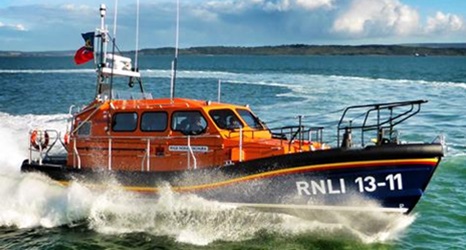 The Shannon is the latest class of all-weather lifeboat to join the RNLI fleet. Designed entirely in house by a team of RNLI engineers and built at the RNLI’s all weather lifeboat centre in Poole, Dorset, the charity harnessed cutting-edge technology to ensure this new lifeboat meets the demands of a 21st century rescue service. Nick Lewis, RNLI Lifeboat Operations Manager at Falmouth said: ‘This is really exciting news for the station and the crew are looking forward to welcoming the new Shannon class lifeboat into Falmouth, where we will have a period of training and familiarization before the lifeboat goes officially on service in 2025.’ more, >>CLICK TO READ<< 09:30
The Shannon is the latest class of all-weather lifeboat to join the RNLI fleet. Designed entirely in house by a team of RNLI engineers and built at the RNLI’s all weather lifeboat centre in Poole, Dorset, the charity harnessed cutting-edge technology to ensure this new lifeboat meets the demands of a 21st century rescue service. Nick Lewis, RNLI Lifeboat Operations Manager at Falmouth said: ‘This is really exciting news for the station and the crew are looking forward to welcoming the new Shannon class lifeboat into Falmouth, where we will have a period of training and familiarization before the lifeboat goes officially on service in 2025.’ more, >>CLICK TO READ<< 09:30
Lobster Fisherman Dexter C. Bray, Sr., “Old Man” of Stonington, Maine has passed away
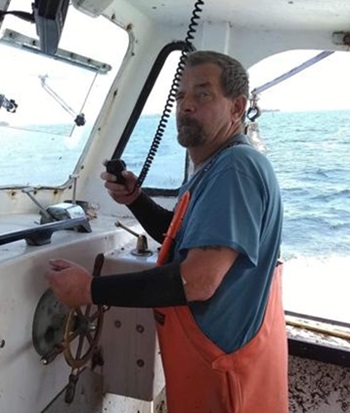 Dexter C. Bray Sr., “Old Man,” born Nov. 15, 1957, passed away peacefully, surrounded by family, on Aug. 23, at age 66. Dexter attended grammar school in Stonington. He was among the first class to graduate from Deer Isle/Stonington High School in 1976. He was a lobstah fisherman most of his life and was very proud of it. He loved being on the water, hunting, socializing, aggravating family and friends, playing bingo, drinking Dunkin’ coffee, watching reality shows, and going out to eat. He also enjoyed morning coffee with his buddies at the co-op. He was a member of Odd Fellows for many years. more, >>CLICK TO READ<< 08:24
Dexter C. Bray Sr., “Old Man,” born Nov. 15, 1957, passed away peacefully, surrounded by family, on Aug. 23, at age 66. Dexter attended grammar school in Stonington. He was among the first class to graduate from Deer Isle/Stonington High School in 1976. He was a lobstah fisherman most of his life and was very proud of it. He loved being on the water, hunting, socializing, aggravating family and friends, playing bingo, drinking Dunkin’ coffee, watching reality shows, and going out to eat. He also enjoyed morning coffee with his buddies at the co-op. He was a member of Odd Fellows for many years. more, >>CLICK TO READ<< 08:24
Athearn Marine Agency Boat of the Week: 83′ Steel Shrimp Freezer Trawler/Dragger, 600HP Cummins KTA-19 Diesel
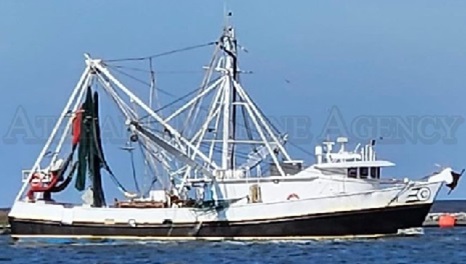 To review specifications, information, and 12 photos’, >click here< To see all the boats in this series, >click here< 06:33
To review specifications, information, and 12 photos’, >click here< To see all the boats in this series, >click here< 06:33
Threat of mobile gear ban in 30% of Scottish waters
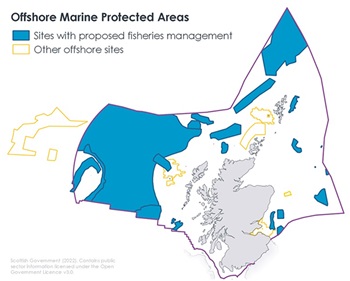 The Scottish government has launched a far-reaching consultation – set to run for just eight weeks – that could see fishing banned from 20 MPAs that cover a third of Scottish waters. As a minimum, it seems set to see five MPAs closed entirely to fishing, with 15 others seeing no-fish zones designated within them. The consultation gives only the option of partial or total fishing bans within the MPAs – it does not allow for a ‘neither option’ response. The government says that a second consultation relating to management and restriction of fishing inside 12nm will follow shortly. For each of the 20 MPAs, a review of fisheries management options, many drafted over a decade ago during the original designation process, is available. These range from the relatively uncontroversial closure of areas such as some deepwater sea mounts that have rarely, if ever, been fished, to much more controversial areas, such as the Central Fladen MPA. more, >>CLICK TO READ<< 16:11
The Scottish government has launched a far-reaching consultation – set to run for just eight weeks – that could see fishing banned from 20 MPAs that cover a third of Scottish waters. As a minimum, it seems set to see five MPAs closed entirely to fishing, with 15 others seeing no-fish zones designated within them. The consultation gives only the option of partial or total fishing bans within the MPAs – it does not allow for a ‘neither option’ response. The government says that a second consultation relating to management and restriction of fishing inside 12nm will follow shortly. For each of the 20 MPAs, a review of fisheries management options, many drafted over a decade ago during the original designation process, is available. These range from the relatively uncontroversial closure of areas such as some deepwater sea mounts that have rarely, if ever, been fished, to much more controversial areas, such as the Central Fladen MPA. more, >>CLICK TO READ<< 16:11
ASMFC Public Hearings on Summer Flounder Draft Addendum XXXV: Changes to Commercial Trawl Mesh Exemption Programs
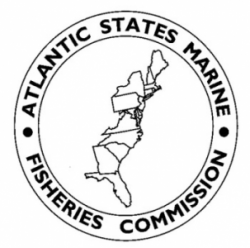 The Atlantic States Marine Fisheries Commission (ASMFC) is seeking public comment on Draft Addendum XXXV to the Interstate Fishery Management Plan (FMP) for Summer Flounder, Scup, and Black Sea Bass. The Draft Addendum considers changes to two exemptions to the summer flounder commercial minimum mesh size requirements: the Small Mesh Exemption Program (SMEP) and the flynet exemption. Two public hearings have been scheduled: one for the New England and Mid-Atlantic states (MA, RI, CT, NY, NJ) and one for the more southern states (MD, VA, NC). Both hearings will be conducted via webinar. Regardless of your state of residence, you are welcome to participate in either virtual hearing. The public hearing details follow: more, >>CLICK TO READ<< 14:20
The Atlantic States Marine Fisheries Commission (ASMFC) is seeking public comment on Draft Addendum XXXV to the Interstate Fishery Management Plan (FMP) for Summer Flounder, Scup, and Black Sea Bass. The Draft Addendum considers changes to two exemptions to the summer flounder commercial minimum mesh size requirements: the Small Mesh Exemption Program (SMEP) and the flynet exemption. Two public hearings have been scheduled: one for the New England and Mid-Atlantic states (MA, RI, CT, NY, NJ) and one for the more southern states (MD, VA, NC). Both hearings will be conducted via webinar. Regardless of your state of residence, you are welcome to participate in either virtual hearing. The public hearing details follow: more, >>CLICK TO READ<< 14:20
U.S. Nuclear Regulatory Agency Approves First Generation IV Nuclear Reactor
 The last time we checked on the nation’s energy industry, the Biden-Harris administration banned drilling for gas and oil on 28 million acres of Alaska (rescinding the order signed by President Donald Trump). However, there is better news on the nuclear energy front. This is good news given that nuclear energy is the only rival to fossil fuels in efficiency and cost-effectiveness and is worthy of supplying power on a civilization-level. The U.S. Nuclear Regulatory Commission has approved construction of the first fourth-generation nuclear reactor in the country. According to Interesting Engineering, the new Hermes reactor will be the first one built in the United States in 50 years that won’t be cooled by light water. Instead, it will use a system of molten fluoride salt, and a TRISO (tri-structural isotropic particle) fuel pebble bed design will power the generator. more, >>CLICK TO READ<< 10:37
The last time we checked on the nation’s energy industry, the Biden-Harris administration banned drilling for gas and oil on 28 million acres of Alaska (rescinding the order signed by President Donald Trump). However, there is better news on the nuclear energy front. This is good news given that nuclear energy is the only rival to fossil fuels in efficiency and cost-effectiveness and is worthy of supplying power on a civilization-level. The U.S. Nuclear Regulatory Commission has approved construction of the first fourth-generation nuclear reactor in the country. According to Interesting Engineering, the new Hermes reactor will be the first one built in the United States in 50 years that won’t be cooled by light water. Instead, it will use a system of molten fluoride salt, and a TRISO (tri-structural isotropic particle) fuel pebble bed design will power the generator. more, >>CLICK TO READ<< 10:37
How a Newport advisory commission ended up a part of the anti-offshore wind controversy
 One of the city’s volunteer advisory commissions was accused of censorship after denying an offer to put opponents of current offshore wind farm projects as experts on a series of educational panels on climate change and offshore wind. While offshore wind opponents, including Councilor David Carlin, argued that the educational panel’s lack of offshore wind opponents made the series unbalanced and unfair, Carlin’s resolution to sponsor a panel of anti-offshore wind speakers was shot down by the rest of City Council for being outside the council’s jurisdiction. In a statement regarding the response from the community and Carlin’s resolution, the commission said the events were designed to be “educational and informational” engagements with experts from their field, not a debate or public hearing. more, >>CLICK TO READ<< 08:04
One of the city’s volunteer advisory commissions was accused of censorship after denying an offer to put opponents of current offshore wind farm projects as experts on a series of educational panels on climate change and offshore wind. While offshore wind opponents, including Councilor David Carlin, argued that the educational panel’s lack of offshore wind opponents made the series unbalanced and unfair, Carlin’s resolution to sponsor a panel of anti-offshore wind speakers was shot down by the rest of City Council for being outside the council’s jurisdiction. In a statement regarding the response from the community and Carlin’s resolution, the commission said the events were designed to be “educational and informational” engagements with experts from their field, not a debate or public hearing. more, >>CLICK TO READ<< 08:04
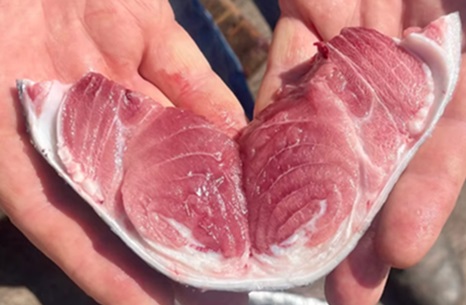
‘More fat, more flavour’: Why PEI tuna is selling at its highest price in decades
“We’re seeing prices range from $10 or $11 on the low side to $40, $50, $60 a pound on the high side. So these are higher prices than we’ve seen, probably since the early 90s,” said Jason Tompkins, owner of TNT Tuna in North Lake, which buys and exports about three-quarters of Canada’s bluefin tuna quota. Tompkins says in a normal season, just “one or two” of the roughly 1,500 tuna caught off the northeast coast of P.E.I. will earn the boat more than $10,000, after being sold on high-end markets around North America, Europe and Japan. So far this year? photos, more, >>CLICK TO READ<< 06:50
Wave Energy: Big waves off Oregon coast fuel cutting-edge effort to harness the ocean for electricity
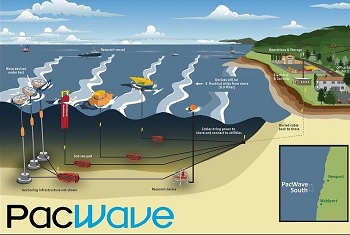 The effort is different from the contentious offshore wind leases planned along the southern Oregon coast. The wave test site is experimental, has a smaller footprint and could directly benefit coastal economies. It also was developed with community input, winning local support. “Wave energy is incredibly attractive as a future renewable power source,” said Bryson Robertson, director of the Pacific Marine Energy Center at Oregon State University. (more project links) “Not only is it capable of generating power close to where we need it, but it can generate it at the time we need it and we can predict it. Which is very useful and powerful for meeting consumer demand.” “It’s different from wind and solar because wave energy just keeps going and going,” Hales said. “It’s more reliable. It could become an essential part of a diversified energy portfolio.” more, >>CLICK TO READ<< 09:39
The effort is different from the contentious offshore wind leases planned along the southern Oregon coast. The wave test site is experimental, has a smaller footprint and could directly benefit coastal economies. It also was developed with community input, winning local support. “Wave energy is incredibly attractive as a future renewable power source,” said Bryson Robertson, director of the Pacific Marine Energy Center at Oregon State University. (more project links) “Not only is it capable of generating power close to where we need it, but it can generate it at the time we need it and we can predict it. Which is very useful and powerful for meeting consumer demand.” “It’s different from wind and solar because wave energy just keeps going and going,” Hales said. “It’s more reliable. It could become an essential part of a diversified energy portfolio.” more, >>CLICK TO READ<< 09:39
Labour needs to fix British fishing – will it stand by its principles now it is in power?
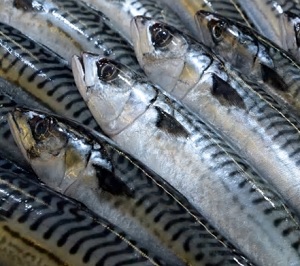 The question now is whether Labour will use its landslide majority to fix the extraordinary neglect of our marine environment that it previously lacked the votes for. Back in 2020, when the fisheries bill was making its way through parliament, Labour’s fisheries spokesperson, Luke Pollard, made the case that the prime objective of the bill should be sustainability: there should be a duty on ministers to take the advice of scientists when allocating fishing opportunities so as to avoid overfishing. He also argued that as the right to fish was a public asset, which ministers conceded during the course of the bill, preference should be given to the part of the fleet which had the highest levels of employment and the lowest environmental impact: the smaller boats, whose activities are limited naturally by the weather. more, >>CLICK TO READ 08:24
The question now is whether Labour will use its landslide majority to fix the extraordinary neglect of our marine environment that it previously lacked the votes for. Back in 2020, when the fisheries bill was making its way through parliament, Labour’s fisheries spokesperson, Luke Pollard, made the case that the prime objective of the bill should be sustainability: there should be a duty on ministers to take the advice of scientists when allocating fishing opportunities so as to avoid overfishing. He also argued that as the right to fish was a public asset, which ministers conceded during the course of the bill, preference should be given to the part of the fleet which had the highest levels of employment and the lowest environmental impact: the smaller boats, whose activities are limited naturally by the weather. more, >>CLICK TO READ 08:24
Russian ‘spy whale’ Hvaldimir found dead near Norway
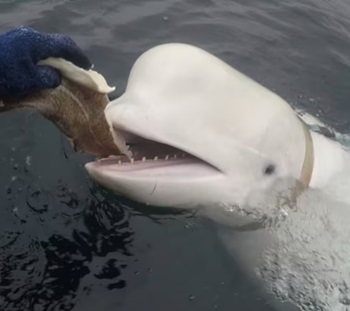 A beluga whale that was suspected of spying for Russia after being discovered in Norwegian waters five years ago has been found dead, according to the non-profit organization that had been monitoring the whale. The body of Hvaldimir — a combination of the Norwegian word for whale and the first name of Russian President Vladimir Putin — was spotted floating in the sea by a father and son fishing in southern Norway over the weekend, Norwegian public broadcaster NRK reported. Hvaldimir was wearing a harness with what appeared to be a mount for a small camera when he was first found in 2019 near the island of Ingoya in Norway’s north, around 300 kilometres from the Russian maritime border. The harness was stamped with “Equipment St Petersburg” in English. more, >>CLICK TO READ<< 07:08
A beluga whale that was suspected of spying for Russia after being discovered in Norwegian waters five years ago has been found dead, according to the non-profit organization that had been monitoring the whale. The body of Hvaldimir — a combination of the Norwegian word for whale and the first name of Russian President Vladimir Putin — was spotted floating in the sea by a father and son fishing in southern Norway over the weekend, Norwegian public broadcaster NRK reported. Hvaldimir was wearing a harness with what appeared to be a mount for a small camera when he was first found in 2019 near the island of Ingoya in Norway’s north, around 300 kilometres from the Russian maritime border. The harness was stamped with “Equipment St Petersburg” in English. more, >>CLICK TO READ<< 07:08

Fishermen service ‘full of joy’ on minster return
A service to commemorate fishermen who have lost their lives at sea took place at Grimsby Minster on Sunday. The service, which has been held annually for more than 60 years, was back at the minster for the first time since the Covid-19 pandemic. Family members of fishermen attended the service while wreaths were also laid by the memorial in St James Square. The Fishermen’s Mission Port Officer Suesan Brown said it was a “solemn occasion” but one that was “so full of joy because it’s that remembering of those people who have gone”. Grimsby was once claimed to be the biggest fishing port in the world and the community was determined to bring the service back to the town. more, >>CLICK TO READ<< 14:40
Fishing vessel with 45 people onboard rescued after engine failure off Tasmanian coast
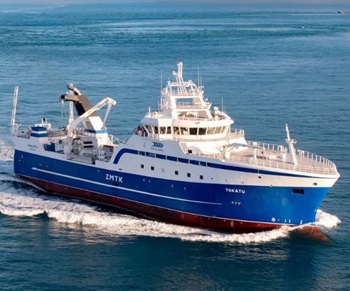 A fishing vessel with 45 people on board has been rescued from wild weather off the coast of Burnie after it experienced engine problems. The 80-metre Sealord Tokatu reportedly lost engine control while at sea early on Saturday morning, leaving it unable to manoeuvre. Two tugs were sent to assist the New Zealand-registered vessel back to the Port of Burnie, where it arrived safely several hours later. “The vessel is now safely back in port,” Harbour Master Captain Mick Wall said. more, >>CLICK TO READ<< 11:23
A fishing vessel with 45 people on board has been rescued from wild weather off the coast of Burnie after it experienced engine problems. The 80-metre Sealord Tokatu reportedly lost engine control while at sea early on Saturday morning, leaving it unable to manoeuvre. Two tugs were sent to assist the New Zealand-registered vessel back to the Port of Burnie, where it arrived safely several hours later. “The vessel is now safely back in port,” Harbour Master Captain Mick Wall said. more, >>CLICK TO READ<< 11:23
New England Fishermen Stage Floating Protest at Vineyard Wind Site
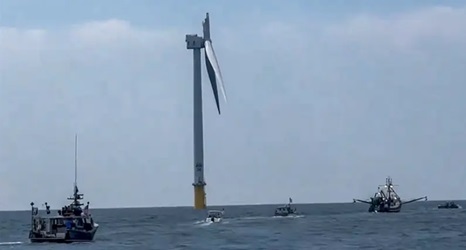 I am continuing to keep an eye on the Vineyard Farms offshore blade failure near Nantucket. A few weeks ago, the facility was closed because of the failure of Vineyard Wind’s newly installed wind turbines, and the city was poised to sue. After one blade failed and ended up in the water, the beaches were cluttered with sharp fiberglass shards, which is a sub-optimum condition at the height of the summer tourist season. The vessels, hoisting anti-offshore wind flags and blasting air horns, departed early Sunday morning from ports in New Bedford, Nantucket, Martha’s Vineyard, Rhode Island and along the Cape, converging at about noon on the site of the crippled Vineyard Wind turbine. “The blade collapse was an eye-opener to a lot of people who before didn’t know that offshore wind is a disaster for the ocean,” said Shawn Machie, 54, who is captain of the New Bedford scalloper F/V Capt. John. more, >>CLICK TO READ<< 09:36
I am continuing to keep an eye on the Vineyard Farms offshore blade failure near Nantucket. A few weeks ago, the facility was closed because of the failure of Vineyard Wind’s newly installed wind turbines, and the city was poised to sue. After one blade failed and ended up in the water, the beaches were cluttered with sharp fiberglass shards, which is a sub-optimum condition at the height of the summer tourist season. The vessels, hoisting anti-offshore wind flags and blasting air horns, departed early Sunday morning from ports in New Bedford, Nantucket, Martha’s Vineyard, Rhode Island and along the Cape, converging at about noon on the site of the crippled Vineyard Wind turbine. “The blade collapse was an eye-opener to a lot of people who before didn’t know that offshore wind is a disaster for the ocean,” said Shawn Machie, 54, who is captain of the New Bedford scalloper F/V Capt. John. more, >>CLICK TO READ<< 09:36
Tom Poland – Wake-up call aboard the F/V Pamela Sue
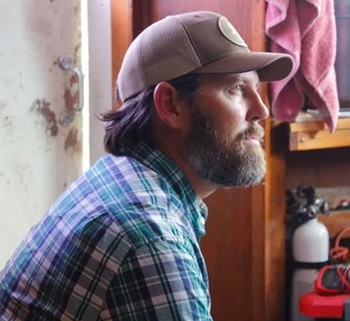 I got up at 4:30 a.m. to go to two Carolina bays in the Francis Marion National Forest. Hours later I left pitcher plants, blue irises and Halloween pennant dragonflies and headed to the McClellanville Diner for a platter of fresh-caught domestic shrimp. Consumers take note: it was not frozen, imported shrimp. After lunch I went into McClellanville, a lovely fishing village that’s home to South Carolina’s largest fleet of shrimp boats. As I made my way into McClellanville, I passed T.W. Graham & Co., another great local restaurant. Hand-painted on its windows were “Support #Freshlocal” and “God Bless Our Shrimpers.” Carolina Seafood sits on Jeremy Creek, a creek named after King Jeremy, a Seewee Indian chief whose tribe lived along the creek’s banks. There I met Capt. Bryan Jones. He catches shrimp, no easy task. Besides the hard and dangerous work, he must overcome many a challenge. Capt. Jones showed me around his boat, Pamela Sue. more, >>CLICK TO READ<< 08:31
I got up at 4:30 a.m. to go to two Carolina bays in the Francis Marion National Forest. Hours later I left pitcher plants, blue irises and Halloween pennant dragonflies and headed to the McClellanville Diner for a platter of fresh-caught domestic shrimp. Consumers take note: it was not frozen, imported shrimp. After lunch I went into McClellanville, a lovely fishing village that’s home to South Carolina’s largest fleet of shrimp boats. As I made my way into McClellanville, I passed T.W. Graham & Co., another great local restaurant. Hand-painted on its windows were “Support #Freshlocal” and “God Bless Our Shrimpers.” Carolina Seafood sits on Jeremy Creek, a creek named after King Jeremy, a Seewee Indian chief whose tribe lived along the creek’s banks. There I met Capt. Bryan Jones. He catches shrimp, no easy task. Besides the hard and dangerous work, he must overcome many a challenge. Capt. Jones showed me around his boat, Pamela Sue. more, >>CLICK TO READ<< 08:31
Downeast businesses are learning from January storms. How Midcoast Maine can learn from Downeast.
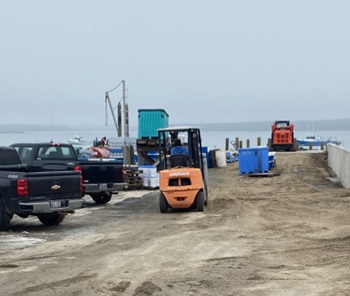 The owners of Chipman’s Wharf, a seafood market, buying station and restaurant in Milbridge, had a brutal awakening after the powerful January storms wiped away their 106-foot wharf. The proprietors, brothers Chris and Jason Chipman and their wives, had insurance that would have covered damage to the pier from fire or an airplane crash, but not storms. The two families are still reeling from the shock. The Maine Coast Fishermen’s Association estimated at least 60 percent of Maine’s working waterfronts were heavily damaged or destroyed in the January storms. Since then, many coastal businesses have had to decide whether to abandon their enterprises or rebuild, hoping to fortify their properties against future major storms — in some cases with a cash infusion from the state. more, >>CLICK TO READ<< 07:16
The owners of Chipman’s Wharf, a seafood market, buying station and restaurant in Milbridge, had a brutal awakening after the powerful January storms wiped away their 106-foot wharf. The proprietors, brothers Chris and Jason Chipman and their wives, had insurance that would have covered damage to the pier from fire or an airplane crash, but not storms. The two families are still reeling from the shock. The Maine Coast Fishermen’s Association estimated at least 60 percent of Maine’s working waterfronts were heavily damaged or destroyed in the January storms. Since then, many coastal businesses have had to decide whether to abandon their enterprises or rebuild, hoping to fortify their properties against future major storms — in some cases with a cash infusion from the state. more, >>CLICK TO READ<< 07:16
Jersey Trawler Sinking – Bail granted for Ukrainian National accused of manslaughter
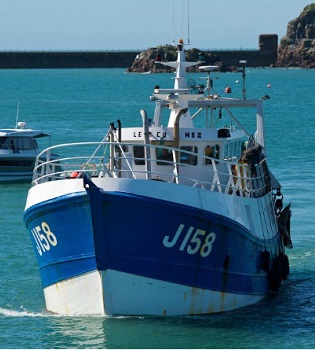 A 34-year-old man charged with three counts of manslaughter in relation to the sinking of the L’Ecume II trawler has been granted bail. Ukrainian national Artur Sevash-Zade is charged in connection with the deaths of skipper Michael Michieli and crewmembers Jervis Baligat and Larry Simyunn. The three men died when their fishing vessel, L’Ecume II, collided with Condor’s Commodore Goodwill freight ship on 8 December 2022. Lewis Peter Carr (29), a UK resident, has also been charged with three counts of manslaughter in relation to the incident. more, >>CLICK TO READ<< 09:54
A 34-year-old man charged with three counts of manslaughter in relation to the sinking of the L’Ecume II trawler has been granted bail. Ukrainian national Artur Sevash-Zade is charged in connection with the deaths of skipper Michael Michieli and crewmembers Jervis Baligat and Larry Simyunn. The three men died when their fishing vessel, L’Ecume II, collided with Condor’s Commodore Goodwill freight ship on 8 December 2022. Lewis Peter Carr (29), a UK resident, has also been charged with three counts of manslaughter in relation to the incident. more, >>CLICK TO READ<< 09:54
Offshore Trojan Horses
 In July, the U.S. Department of Interior greenlighted large offshore wind farms in New Jersey and Maryland. Once the financial agreements are in place, New Jersey’s Atlantic Shores and Maryland’s Marwin and Momentum will join the two large wind farms in New York approved in June. These projects will receive huge, multibillion-dollar subsidies from the federal government and electricity ratepayers. What benefits will New Jersey and Maryland enjoy from this flood of money? To answer this question, it is best to recall the classic warning of the Trojan Horse legend, “Beware of Greeks bearing gifts”—in other words, the hidden dangers of accepting something that seems too good to be true. New York State ignored that warning when it agreed to pay very high prices for the electricity to be supplied from its new offshore wind farms—Empire Wind 1 and Sunrise Wind—located off the coast of Long Island. more, >>CLICK TO READ<< 07:37
In July, the U.S. Department of Interior greenlighted large offshore wind farms in New Jersey and Maryland. Once the financial agreements are in place, New Jersey’s Atlantic Shores and Maryland’s Marwin and Momentum will join the two large wind farms in New York approved in June. These projects will receive huge, multibillion-dollar subsidies from the federal government and electricity ratepayers. What benefits will New Jersey and Maryland enjoy from this flood of money? To answer this question, it is best to recall the classic warning of the Trojan Horse legend, “Beware of Greeks bearing gifts”—in other words, the hidden dangers of accepting something that seems too good to be true. New York State ignored that warning when it agreed to pay very high prices for the electricity to be supplied from its new offshore wind farms—Empire Wind 1 and Sunrise Wind—located off the coast of Long Island. more, >>CLICK TO READ<< 07:37
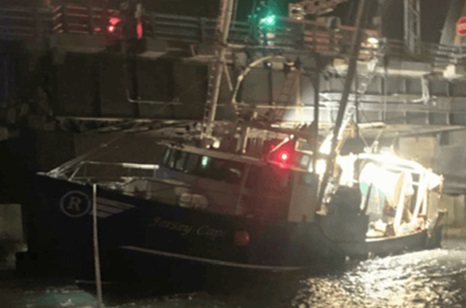
Fishing Boat Collides with Middle Thorofare Bridge Following Power Failure
At approximately 9:30 PM on Friday, August 30th, a distress call was placed at the Middle Thorofare Bridge, alerting authorities to a serious incident involving the 90-foot commercial fishing vessel F/V Jersey Cape. The vessel had suffered a power failure and was left adrift, eventually becoming pinned against the north side of the bridge. Strong northeast winds, clocking in at over 20 MPH, combined with an outgoing tide, pushed the vessel into the bridge’s structure, complicating rescue efforts. Photos, more, >>CLICK TO READ<< 06:01
Fishermen Fight for Their Livelihoods Against Wind Farm Project in New England
 In a recent interview with Fox Business, Jerry Leeman, CEO of the New England Fishermen’s Stewardship Association, expressed his deep concerns about the impact of a wind farm project off the coast of Nantucket on the livelihoods of local fishermen. The discussion, hosted by Dagen McDowell and Sean Duffy on “The Bottom Line,” highlighted the growing tension between environmental initiatives and the preservation of traditional industries like fishing. Leeman opened the conversation by addressing what he described as “greenwashing,” a term used to suggest that the wind farm project is being marketed as environmentally friendly while ignoring the negative consequences. “We have been greenwashed into thinking this is a good idea,” Leeman stated. He explained that the construction and operation of wind turbines are displacing vital fish stocks and creating dangerous debris fields that could threaten the safety of fishermen. Photos, more, >>CLICK TO READ<< 14:50
In a recent interview with Fox Business, Jerry Leeman, CEO of the New England Fishermen’s Stewardship Association, expressed his deep concerns about the impact of a wind farm project off the coast of Nantucket on the livelihoods of local fishermen. The discussion, hosted by Dagen McDowell and Sean Duffy on “The Bottom Line,” highlighted the growing tension between environmental initiatives and the preservation of traditional industries like fishing. Leeman opened the conversation by addressing what he described as “greenwashing,” a term used to suggest that the wind farm project is being marketed as environmentally friendly while ignoring the negative consequences. “We have been greenwashed into thinking this is a good idea,” Leeman stated. He explained that the construction and operation of wind turbines are displacing vital fish stocks and creating dangerous debris fields that could threaten the safety of fishermen. Photos, more, >>CLICK TO READ<< 14:50
Last trawler used in Falklands War to be scrapped
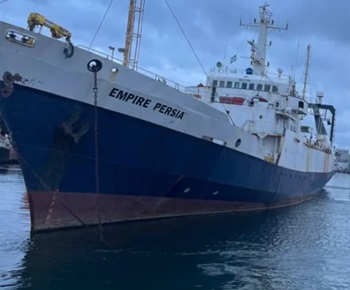 The last of the fishing trawlers requisitioned by the UK government to take part in the Falklands conflict is being scrapped. The Farnella, now known as the Empire Persia, was built on Tyneside in 1972 and was one of nine civilian vessels from Hull to travel to the South Atlantic in 1982. It then went on to become a treasure hunting ship on operations to find wrecks, some carrying gold and silver worth millions of pounds. Robb Robinson, maritime historian at Hull University said: “The Farnella is one of a long line of trawlers to serve in wartime and has had an amazing history since, it really is unique.” Photos, more, >>CLICK TO READ<< 10:17
The last of the fishing trawlers requisitioned by the UK government to take part in the Falklands conflict is being scrapped. The Farnella, now known as the Empire Persia, was built on Tyneside in 1972 and was one of nine civilian vessels from Hull to travel to the South Atlantic in 1982. It then went on to become a treasure hunting ship on operations to find wrecks, some carrying gold and silver worth millions of pounds. Robb Robinson, maritime historian at Hull University said: “The Farnella is one of a long line of trawlers to serve in wartime and has had an amazing history since, it really is unique.” Photos, more, >>CLICK TO READ<< 10:17
Federal government will hold first-ever offshore wind auction off the Oregon coast in October
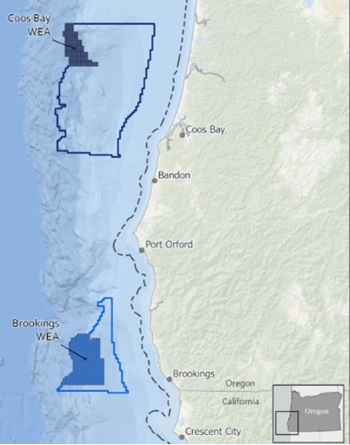 The federal government says it will hold Oregon’s first-ever offshore wind energy lease sale in mid-October to auction two areas where developers can build floating wind turbines. The announcement by the U.S. Department of the Interior on Thursday cements the development of offshore wind in Oregon despite vehement opposition from coastal communities, the state’s fishing industry and local tribes who say the process was rushed and ignored local input. The auction, to be held by the Bureau of Ocean Energy Management on Oct. 15, will include two areas totaling nearly 195,000 acres. The Coos Bay lease area consists of 61,203 acres and is about 32 miles from shore and the Brookings lease area is 133,792 acres and around 18 miles from shore. more, >>CLICK TO READ<< 08:56
The federal government says it will hold Oregon’s first-ever offshore wind energy lease sale in mid-October to auction two areas where developers can build floating wind turbines. The announcement by the U.S. Department of the Interior on Thursday cements the development of offshore wind in Oregon despite vehement opposition from coastal communities, the state’s fishing industry and local tribes who say the process was rushed and ignored local input. The auction, to be held by the Bureau of Ocean Energy Management on Oct. 15, will include two areas totaling nearly 195,000 acres. The Coos Bay lease area consists of 61,203 acres and is about 32 miles from shore and the Brookings lease area is 133,792 acres and around 18 miles from shore. more, >>CLICK TO READ<< 08:56
A Day In The Life Of: Maryport fisherman Shaun Humphreys
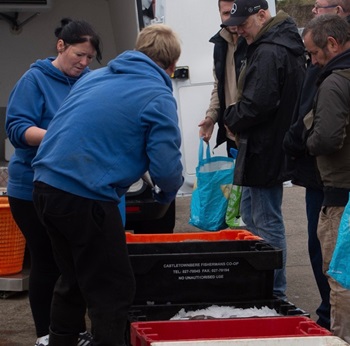 “I’ve been fishing all my life. I was getting a bit fed up with it all – the same old stuff, and not knowing what prices you were going to get – but now I love it.” Fifty-two-year-old Shaun’s career started at a young age, fishing with his great-uncle. “I started going out with him when I was really young. I was out on trawlers long before I left school.” On leaving school, Shaun’s career as a professional fisherman began – and by the 1990s he was skippering his own vessels. Fishing out of Maryport, targeting seasonal mixed flatfish, Nephrops and scallops, Shaun is now on his third vessel, Chelaris MT 23 – with his brother Wayne and son Cameron crewing. The Covid pandemic of 2020 led to the vessel’s name also becoming familiar with the people of Maryport, helping Shaun to rekindle his passion for fishing in the process. more, >>CLICK TO READ<< 07:30
“I’ve been fishing all my life. I was getting a bit fed up with it all – the same old stuff, and not knowing what prices you were going to get – but now I love it.” Fifty-two-year-old Shaun’s career started at a young age, fishing with his great-uncle. “I started going out with him when I was really young. I was out on trawlers long before I left school.” On leaving school, Shaun’s career as a professional fisherman began – and by the 1990s he was skippering his own vessels. Fishing out of Maryport, targeting seasonal mixed flatfish, Nephrops and scallops, Shaun is now on his third vessel, Chelaris MT 23 – with his brother Wayne and son Cameron crewing. The Covid pandemic of 2020 led to the vessel’s name also becoming familiar with the people of Maryport, helping Shaun to rekindle his passion for fishing in the process. more, >>CLICK TO READ<< 07:30
Why Is Cheap Wind Power So Expensive?
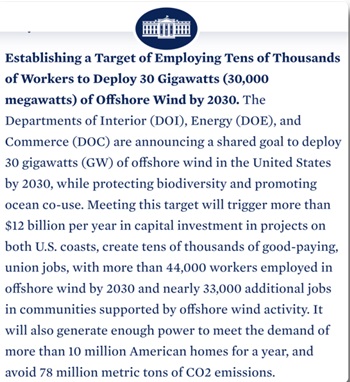 Hmmm, sez I, seems a mite ambitious. Current US grid-connected offshore wind is a mere 0.17 gigawatts … so we’d need to do ~ 175 times as much as we’ve done to date and do it in a short six years. So, I divided it out. There are 65 months until 2030. Thirty gigawatts are thirty thousand megawatts, less the 174 megawatts in place, that’s 29,826 megawatts more total generating capacity needed. 29,826 megawatts divided by 65 months means we’d have to add offshore wind generation to the tune of 465 additional megawatts of generation capacity per month. Every month. Starting now. Get real. That’s not remotely possible. The biggest US offshore windfarm just came online, 132 MW capacity. To reach the White House goal, every month we’d need to build three new windfarms of that size. No way that can happen. It’s just numbers picked out of the air to gain popular support. more, >>CLICK TO READ<< 13:30
Hmmm, sez I, seems a mite ambitious. Current US grid-connected offshore wind is a mere 0.17 gigawatts … so we’d need to do ~ 175 times as much as we’ve done to date and do it in a short six years. So, I divided it out. There are 65 months until 2030. Thirty gigawatts are thirty thousand megawatts, less the 174 megawatts in place, that’s 29,826 megawatts more total generating capacity needed. 29,826 megawatts divided by 65 months means we’d have to add offshore wind generation to the tune of 465 additional megawatts of generation capacity per month. Every month. Starting now. Get real. That’s not remotely possible. The biggest US offshore windfarm just came online, 132 MW capacity. To reach the White House goal, every month we’d need to build three new windfarms of that size. No way that can happen. It’s just numbers picked out of the air to gain popular support. more, >>CLICK TO READ<< 13:30
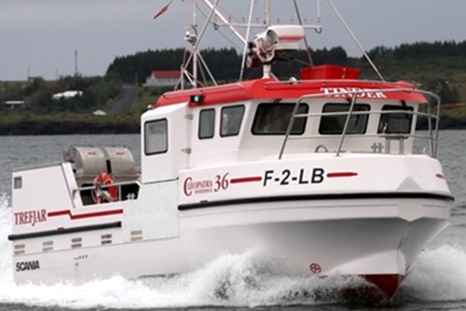
Norwegian fisherman’s new Cleopatra 36
Kjøllefjord skipper owner Daniel Lauritzen has taken delivery of a new Cleopatra 36 from Icelandic boatbuilder Trefjar. F/V Tinder is a standard Cleopatra 36 measuring 10.99 metres and with a 3.80-metre beam, and is rigged for longlining and gillnetting, and also ready for fishing king crab part of the year. The main engine is a 350hp Scania D9 driving a ZF286IV transmission, and a 9kW Nanni 9kW generator fitted in the engine room provides auxiliary power. more, >>CLICK TO READ<< 12:20
Klamath River and its salmon free-flowing after final two dams breached in California
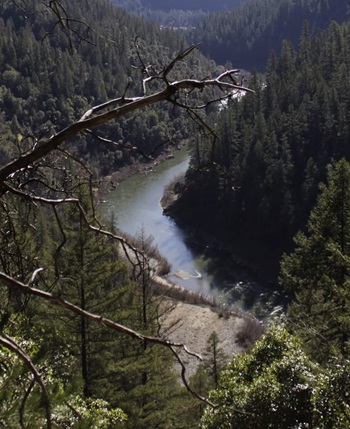 After more than a century of being blocked by a series of dams, the Klamath River is once again free flowing after two cofferdams in northern California were breached on Wednesday, according to the office of Governor Gavin Newsom. Letting the river flow without being constrained by dams gives native fish species, like steelhead, coho and Chinook salmon a chance to regain access to more than 400 miles of spawning and rearing habitat on the Klamath and its tributaries in California and Oregon. It allows Native American groups in the region like the Klamath, the Yurok and Karuk Tribes to regain access to culturally important food sources. The river was once a major habitat for salmon, but construction of hydroelectric dams in California and Oregon over the last century took a toll on water quality and reduced the population of the fish, which have to migrate to the Pacific Ocean, then return upstream to reproduce. The four dams on the river made that journey much more difficult. more, >>CLICK TO READ<< 10:54
After more than a century of being blocked by a series of dams, the Klamath River is once again free flowing after two cofferdams in northern California were breached on Wednesday, according to the office of Governor Gavin Newsom. Letting the river flow without being constrained by dams gives native fish species, like steelhead, coho and Chinook salmon a chance to regain access to more than 400 miles of spawning and rearing habitat on the Klamath and its tributaries in California and Oregon. It allows Native American groups in the region like the Klamath, the Yurok and Karuk Tribes to regain access to culturally important food sources. The river was once a major habitat for salmon, but construction of hydroelectric dams in California and Oregon over the last century took a toll on water quality and reduced the population of the fish, which have to migrate to the Pacific Ocean, then return upstream to reproduce. The four dams on the river made that journey much more difficult. more, >>CLICK TO READ<< 10:54






